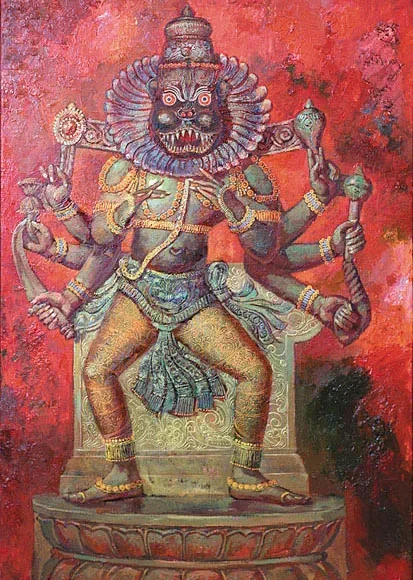PISHACHAS There are millions of Jakhyas (Yakshas), Kinnaras and Pisachas (Pishachas). (Gauri Sukhmani M. 5, p. 276) Pishachas are friends and evil spirits. Vedas consider them lower than Rakshasas. They hare ill-natured spiteful and mischievous beings. It is said that they were created by Brahma alongwith other demons. They are said to haunt the earth and inhabit the forests. Sometimes the aborigines and wild tribes are also called Pishachas.
References :
1. Kohli,Surindar Singh ed,Dictionary of Mythological References in Guru Granth Sahib 1993
Pishachas are malevolent beings in Hindu mythology, often described as flesh-eating demons or spirits. They are associated with darkness, fear, and chaos, and are believed to haunt cremation grounds, desolate places, and areas of death. Their presence is a recurring theme in Hindu and Buddhist traditions, symbolizing the darker aspects of existence.
Key Aspects of Pishachas:
Origins:
- According to some legends, Pishachas were created by Brahma, while others suggest they are the offspring of Krodha (anger) or Daksha’s daughter Pishacha.
- They are said to have emerged as manifestations of negative emotions and primal instincts.
Appearance:
- Pishachas are depicted as grotesque beings with dark complexions, bulging veins, and glowing red eyes. Their skeletal forms and terrifying features reflect their association with death and decay.
Abilities:
- These beings are believed to possess supernatural powers, including shapeshifting, invisibility, and the ability to possess humans, causing insanity or other afflictions.
- They are also known to feed on human energy and flesh, further emphasizing their malevolent nature.
Role in Mythology:
- Pishachas are often portrayed as obstacles or adversaries in epics like the Mahabharata and Ramayana. For instance, they are said to have fought alongside Ghatotkacha against Karna in the Mahabharata.
- They are also linked to the underworld and are considered guardians of hidden treasures in some traditions.
Cultural Beliefs and Practices:
- To ward off Pishachas, specific mantras and rituals are performed during religious ceremonies. Offerings are sometimes made to appease them and prevent their interference.
- Improper burial rites are believed to result in the deceased becoming Pishachas, emphasizing the importance of proper funeral practices.
Symbolism:
- Pishachas symbolize the darker aspects of human nature, such as greed, anger, and destructive tendencies. Their stories serve as cautionary tales about the consequences of succumbing to negative emotions.
Pishachas remain a fascinating and chilling element of Hindu mythology, blending themes of fear, morality, and the supernatural.



